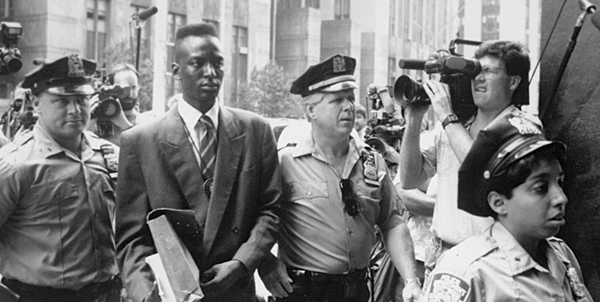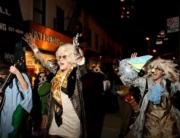
Yusef Salaam escorted by police (Clarence Davis/NY Daily News Archive via Getty Images)
Made by Ken Burns, along with his daughter Sarah and her husband David McMahon, The Central Park Five examines an infamous assault and the wrongful convictions of five teenage boys, while detailing what happens when an inflammatory case hits a city already seething with crime and racial tensions.
In April 1989, a 28-year-old white woman was brutally raped and beaten in Central Park. The case caught the interest of the media, and not just the tabloids. Interest in the story spread into a flame, dividing a crime-ridden city already sharply divided by race, economic, and social class. The New York Police Department and the office of the district attorney quickly arrested and indicted five black and Latino teenagers for the crime: Raymond Santana, Korey Wise, Kevin Richardson, Antron McCray, and Yusef Salaam. However, in 2003, because of DNA evidence and the confession of the actual perpetrator, Matias Reyes, the convictions of all five were overturned.
Featuring interviews with all five men, four of whom chose to appear on camera, the documentary examines the case from the night of the crime to their exoneration. (McCray speaks off camera due to fear of being exposed.) Additional interviews from journalists, lawyers, sociologists, and former Mayor Ed Koch help to round the story out.
Although Burns and his team attempted to get in touch the prosecutors and officers who handled the case, they were declined each time. That missing perspective echoes loudly in the film, especially since the inclusion of footage of the clearly intimidated and coached confessions of the five boys is damning. Perhaps the voluntary absence of the NYPD and (then Assistant District Attorney and lead prosecutor) Elizabeth Lederer says all that needs to be said about the handling of the case.
The media tornado that swirled around the crime has given it a notoriety that tends to eclipse all other aspects of the story, and the coverage of their trial was much more extensive than the exoneration of their names. In order to give them back their voices, the filmmakers are wise in allowing most of the camera time to the men. Their words and their expressions make clear that there were more victims in this case than just the jogger. None of the five will ever get the lives they could have had back, despite the clearing of their names. Each spent a significant time in prison. Korey Wise spent the most; he was incarcerated for 13 years.
(An interesting addendum to the case has recently been in the news again due to the film. The five men brought a civil suit against the city in 2003, which to this day has not yet been settled or been brought to court. This September, the city of New York filed a subpoena against the filmmakers for outtakes and edited footage to use for their side of the suit against the plaintiffs.)
A Ken Burns documentary is generally a quality piece of filmmaking. That reason alone is not why you should see this film. The story of the Central Park Five should be told and should be heard as a lesson and a warning. It is a stark reminder of how fears can play on people to such an extent that they willfully ignore facts, innocence, and truth, resulting in the destruction of lives that resounds to this day.






Leave A Comment